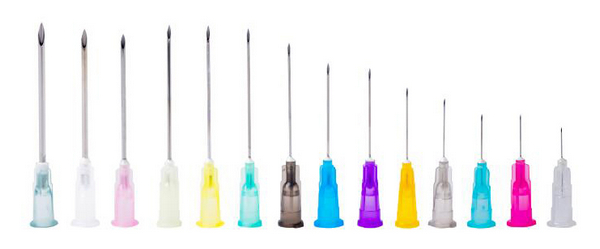Selecting Needles for Parenteral Injections
Written by Prince Assandoh-Mensah in 2017
With Special Support From, PNO Ruth Adjei ( University Health Services, Legon)
There are over 30 different kinds of needles available for use, yet most of these needles have not been fully explored in the clinical setting. Different needle types are available to enhance safe and accurate healthcare delivery and also, to promote patient comfort.
Pain is a major contributor to refusal of parenteral medications. However choosing the correct needle type may reduce the level of pain experience.
In selecting the correct needle type, there is the need for the clinician to conduct a thorough clinical assessment of the patient; the route site, the muscle mass at the route site and the amount of adipose tissue covering the muscle. The age of the patient and the viscosity of the solution (medication) to be administered must also be considered.
Needles for injections are broadly classified according to their Diameter (referred to as Gauge) and Length. Clinically, needle Gauges range from 16 to 32. The larger the number of the gauge, the smaller the diameter of the needle. Viscous drug formulations or medications that contain suspended particles must be given through needles of larger diameter (that is Low Gauge Number).
Needle length are usually measured in inches (denoted by “) or its equivalent in millimetres (mm). The clinically common ones are 2”, 1.5”, 1”,5/8”,1/2”, and 1/3”. There are a lot more you may come across. Unlike needle gauge, needle length correspond directly with the value of its measurement, thus the higher the number, the longer the needle. Route site that involves a deeper penetration may require a longer needle.
The standard intramuscular needle is #21 to #22 needle gauge 1” to 1.5” long. A smaller needle such as #23 to #25 gauge needle 1inch long is commonly used for the deltoid muscle. More viscous solutions require a larger gauge (e.g #20 Gauge Needle). Very obese people may require a needle longer than 1.5” (E.g. 2” long needle) and emaciated people may require a shorter needle (E.g. 1” long) for intramuscular injection.
Note: The standard green needle prepackaged with most syringes is #21 Needle Gauge 1.5” long.
#25 to #27 Gauge needles 3/8 to 5/8 inches long are typically used for subcutaneous injections for adults and children alike. Some newer medications such as Novomix Flexpen for diabetes recommends using 30 or 31 gauge 1/3 inch needles which are ultra-fine.
Larger needle gauges from #18 and below may be used for withdrawing medications from vials and ampoules and also withdrawing solutions for reconstitution. Some have been designed with special features such as in-built filters with or without blunt tip to help facilitate this purpose.
Note that, there are a lot of different colour codes for needle types that make it difficult to identify a particular needle gauge by colour. Adapting to one colour code may be confusing at times as different suppliers may supply different colour codes. Always remember to check the type by the numbers not the colour.
Next time you make up your mind to give an injection, remember to choose the right needle type.
REFERENCE
Berman, Audrey.Kozier, Barbara. (Eds.) (2008) Kozier & Erb’s fundamentals of nursing :concepts, process, and practice Upper Saddle River, N.J. : Pearson Prentice Hall,
Injection Types: Angles, Needles and Gauges. Retrieved on 8th November, 2017 from https://www.scribd.com/doc/25108827/Injection-Types-Angles-Needles-and-Gauges
Quan K., How To Determine Needle Size. Retrieved on 8th November, 2017 from http://nursinglink.monster.com/benefits/articles/8243-how-to-determine-needle-size
Swonger, AK., Matejski MP. (1991). Nursing Pharmacology: an integrated approach to drug therapy and nursing practice. J.B. Lippincott Company, Philadelphia
Vitality Medical. (2017). Selecting Syringes and Needles. [online] Available at: https://www.vitalitymedical.com/blog/selecting-syringes-and-needles.html [Accessed 8 Nov. 2017].




